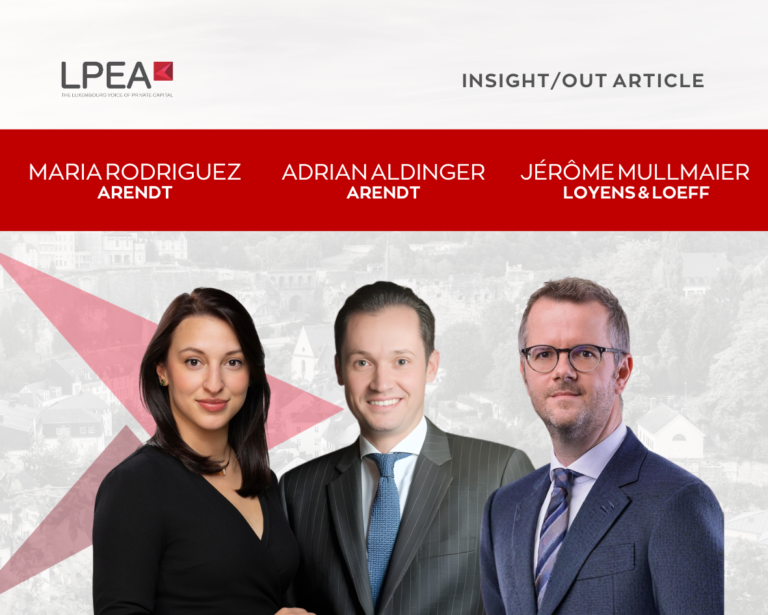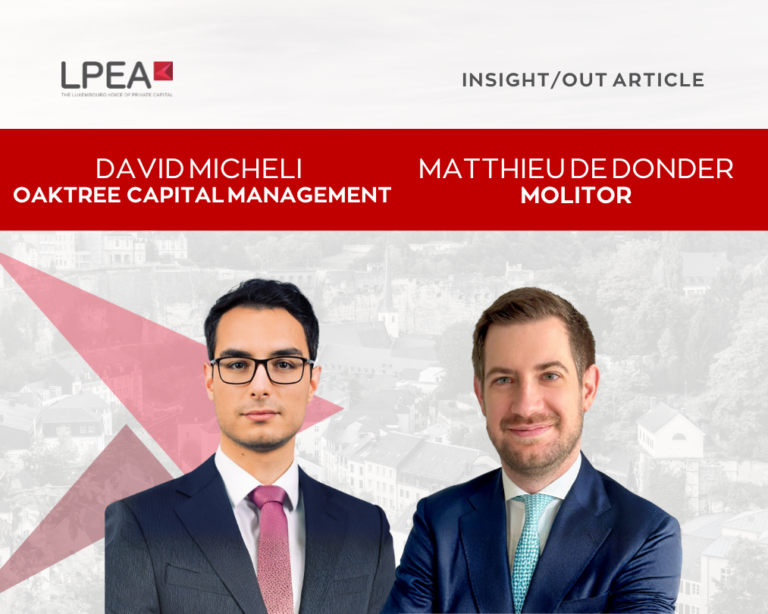Opportunities offered by the Luxembourg VAT group regime for the private equity (PE) and other alternative investment sectors
by Joachim Bailly (Partner), Michel Lambion (Managing Director) and Cédric Tussiot (Director), Deloitte Tax & Consulting
A lot has been said and written about the introduction of the VAT group regime in Luxembourg which is effective as from 31 July 2018[1], but not much about its potential use by the PE and other alternative investment sectors (real estate, debt funds, etc.). It is rather surprising given that allowing non-taxable persons such as “passive” holdings to be members of a VAT group is primarily aimed for these sectors.
Indeed, the Luxembourg regime allows any person established in Luxembourg to be member a VAT group. Unlike most of EU VAT group regimes, it does not require that members of a VAT group are VAT taxable person or are corporate bodies. This implies that a “passive” holding company, which is not a VAT taxable person[2] or persons without legal personality such as SCSp or individuals could be members of a VAT group. This is an important element for investment platform, which, most often, include such type of entities.
Absence of VAT on services between members of the group
The main effect of the VAT group regime is that several legally independent persons, but closely linked from an economic, financial and organizational viewpoint, are considered as one single tax payer. This implies that all supplies of services and goods between members of a VAT group become internal transactions to the group and therefore not subject to VAT.
Due to their activities (holding, financing), most companies involved in PE and alternative management structures are unable to recover VAT on their costs, or only partly. For example, when a ServiceCo or a MasterCo[3] provide administrative services to the different layers of the investment platform, it must charge 17% of VAT and this VAT is, most often, not recoverable. VAT is therefore a final cost. The setting-up of a VAT group will allow these services be considered as internal transactions not subject to VAT.
The setting up of a VAT group between the GP and a SCSp not qualifying as an AIF and which could thus not benefit from VAT exempt management services would also be of interest for services charged by the GP to the SCSp.
Impact on the VAT deduction right
Another advantage for the PE and alternative investment sectors lies in the VAT deduction rules. Indeed, the VAT deduction of the VAT group is determined based on the global turnover of the group with third parties. Internal transactions between the members are disregarded for the computation of the VAT deduction right of the VAT group. For example, when Lux SPVs charge management services to their target companies established outside Luxembourg and not part of the VAT group, this turnover opens them the right to recover VAT on costs. Should these Lux SPVs be grouped with the upper level of the Luxembourg investment platform, the VAT deduction right of the VAT group would be determined taken into account its turnover which is represented by the management services charged by the Lux SPVs and that opens the right to deduct VAT. This VAT deduction right will, in principle, apply on all costs incurred by the group including by the upper level of the platform. However, we should mention the administrative circulars 765 and 765-1. These circulars remind that taxable persons, which have also exempt activities (e.g. granting of loans) or activities not in the scope of VAT (e.g. passive holding of shares) must allocate as precisely as possible their costs to their activities (real utilisation method or special prorate) and use the general prorate only for non-allocable costs.
As mentioned above, internal transactions between group members are disregarded for VAT and group members will not have anymore to determine their own VAT deduction right and apply it on their costs. For example, if a member of the investment platform provides loans (LuxFinco in our example[4]) to another Luxembourg member of the platform, it cannot recover VAT on its costs. Should the investment platform be VAT grouped, interest on these loans would “disappear” for the computation of the VAT deduction right of the group and the company granting loans would indirectly “benefit” from the VAT deduction right of the group.
The VAT deduction right of the SPVs will thus be “propagated” to all other entities members of the VAT group that have only activities towards other members of the VAT group. The same would also exist for real estate structures when the Luxembourg Propco could recover VAT because its activity is VATable and entitled VAT deduction.
Of course, should the VAT group also receive exempt income from non-members (e.g. interests on loans to the target companies), the VAT group would be able to recover only partly VAT on its costs and an apportionment of VAT might be necessary. The same remark is valid for VAT in connection with shares owned in companies not part of the VAT group as a “passive” holding (i.e. without involvement in their management (see footnote 2)). A case-by-case analysis is thus necessary.
Who could or must be part of the VAT group?
Any person established in Luxembourg including Luxembourg branches of foreign companies could be member of a VAT group. As already mentioned, there is no restriction such as being a VAT taxable person or a corporate body. However, the VAT group is purely national and has no cross-border effects.
A person could be member of only a Luxembourg VAT group. This means that an AIFM may not be part of the VAT groups set up by different investment platforms. The same remark applies to a Serviceco set up by a PE house and that provides services to different investment platforms set up by the PE house.
In principle, all persons meeting the three above-mentioned links (economic, financial and organizational) must be members of the VAT group. Companies could thus not practice “cherry-picking”. However, an “opt-out” option is available for persons closely linked when they are not interposed in the economic flow between two members of the group and if their non-affiliation to the group does not imply a VAT saving. This opt-out potion could be useful, for example, when a group envisages selling some companies in a relatively short delay. Members should stay in the group at least two calendar years except if the links ceases to exist (e.g. in the case a company is sold).
Another interesting feature of the VAT group regime is the pragmatic definition of the financial, economic and organizational links that must exist between the members. The law defines financial links as either the direct or the indirect ownership of at least 50% of the shareholders or members’ voting rights of an undertaking or the fact to exercise a “de facto” control. A “de facto” control exists when a shareholder has the right to appoint or remove a majority of the members of the administrative, management, or supervisory body of another undertaking or control alone, pursuant to a shareholder agreement, a majority of the shareholders’ or members’ voting right of another undertaking.
The law also defines economic links in an extensive and flexible manner. These links exist when the activities of the companies are of the same nature; the activities of the companies are complementary or combined for the achievement of a common economic objective, or when a member exercises fully or partly its activities for the benefit of the other members.
Lastly, the law defines organizational links as the legal or de facto control of the management of a company.
The definition of the links by reference to the Luxembourg corporate law combines the advantage of the legal security offered by a well-known and established practice and enough flexibility. The law defines the links in such a manner that a large number of Luxembourg investment platforms should meet them.
Organizational aspects
The group must designate a member as the representative of the group with the VAT authorities. This representative must apply for a VAT identification number on behalf of the group. At that time, the VAT group should provide a file containing different information regarding its members, persons having opt-out, evidences of the links including a certification of the financial links by an auditor or a chartered accountant (to be renewed annually), activities, and organization. The VAT group will file the VAT returns of the group under this VAT number. The VAT returns will consolidate all transactions with third parties. The annual VAT return must contain a listing of transactions between the members because the VAT return does not include these transactions disregarded for VAT.
VAT numbers of the members that exist before the setting up of the group remain active as “auxiliary” VAT numbers of the group who will use them for relationships with third parties. Members no longer must file individual returns.
Lastly, an important feature of the VAT group is the joint liability of each members towards the VAT authorities of the VAT due by the group
As a conclusion, the introduction of the VAT group offers opportunities also for the PE and alternative investment sectors. The main reasons are the possibility to include holding companies in the group and the flexible definition of the links that should exist between the members. In practice, this regime should benefit to the PE and other alternative investment sectors by excluding from the scope of VAT services rendered by a Serviceco or a Masterco to the different entities of the investment platform or services rendered by a GP to a SCSp not qualifying as an AIF. It may also extend, in some cases, the VAT deduction right of SPVs or Propcos to the entire investment platform. Of course, each specific situation deserves a case-by-case and careful analysis of the pro and cons.
[1] VAT law of 6 August 2018 published in the Official Journal of 10 August 2018.
[2] A holding qualifies as “passive” when its activities are limited to the ownership of shares in other companies without direct or indirect involvement in the management of these companies except the exercise of their shareholder rights. In this case, the holding company is not a VAT taxable person and cannot recover VAT on its costs. On the other hand, a holding qualifies as an “active” one and is a VAT taxable person when it involves in the management of the companies in which it hold shares. Examples of involvement in the management are invoicing of management services, granting of loans, renting of premises, etc. Under some conditions, it could recover VAT on its costs.
[3] For the purpose of our article, and has illustrated by our example of Luxembourg investment platform, we have assumed that the PE house is the majority shareholder of the ServiceCo and has the power to nominate or revoke the majority of the administrative and management bodies of the GP and the other vehicles of the platform.
[4] Same remark as under footnote 3.





